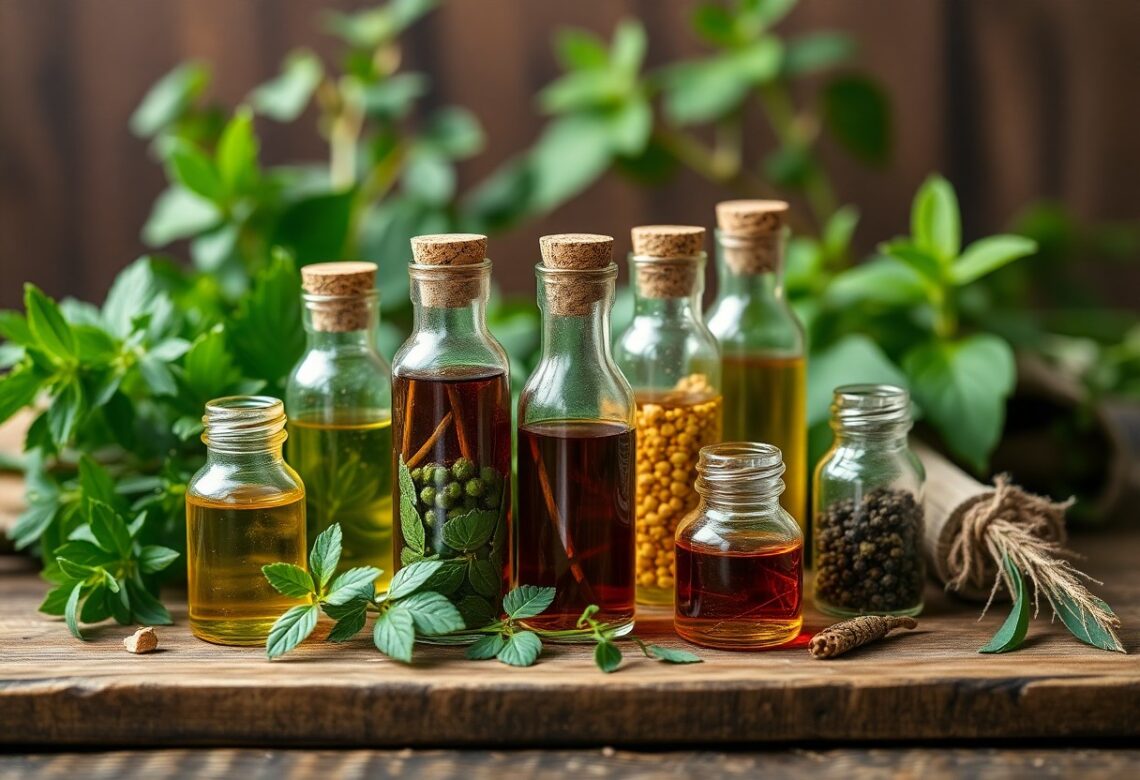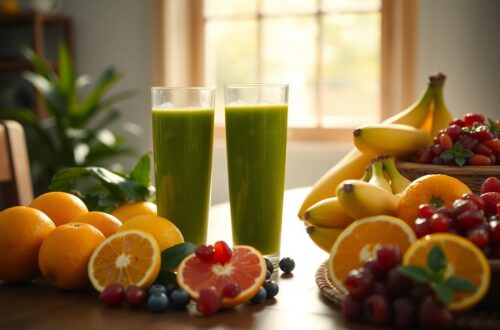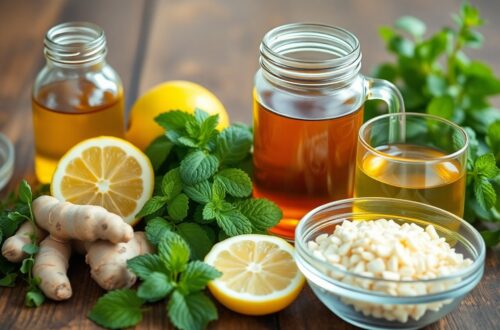Just as nature provides us with an abundance of resources, botanical extracts offer a wealth of benefits for your health and wellness. In this guide, you will explore various plant-derived extracts, including their properties, advantages, and applications. Whether you’re looking to enhance your skincare routine or improve your overall well-being, understanding these beneficial compounds will empower you to make informed choices. Dive into the fascinating world of botanical extracts and discover how they can elevate your daily life.
Key Takeaways:
- Botanical Extracts offer a variety of health benefits, including anti-inflammatory and antioxidant properties.
- Extraction Methods determine the potency and effectiveness of the botanical extracts, with techniques like cold pressing and steam distillation being common.
- Safety Considerations are vital, as some extracts may cause allergic reactions or interact with medications.
- Quality Standards play a significant role in the efficacy of botanical extracts, emphasizing the need for third-party testing and certification.
- Applications of botanical extracts span various industries, including cosmetics, food, and pharmaceuticals, highlighting their versatility.
- Popular Extracts such as echinacea, ginseng, and turmeric are widely recognized for their distinctive health benefits and traditional uses.
- Research and Development continue to evolve, with ongoing studies exploring the potential of lesser-known botanical extracts and their health implications.
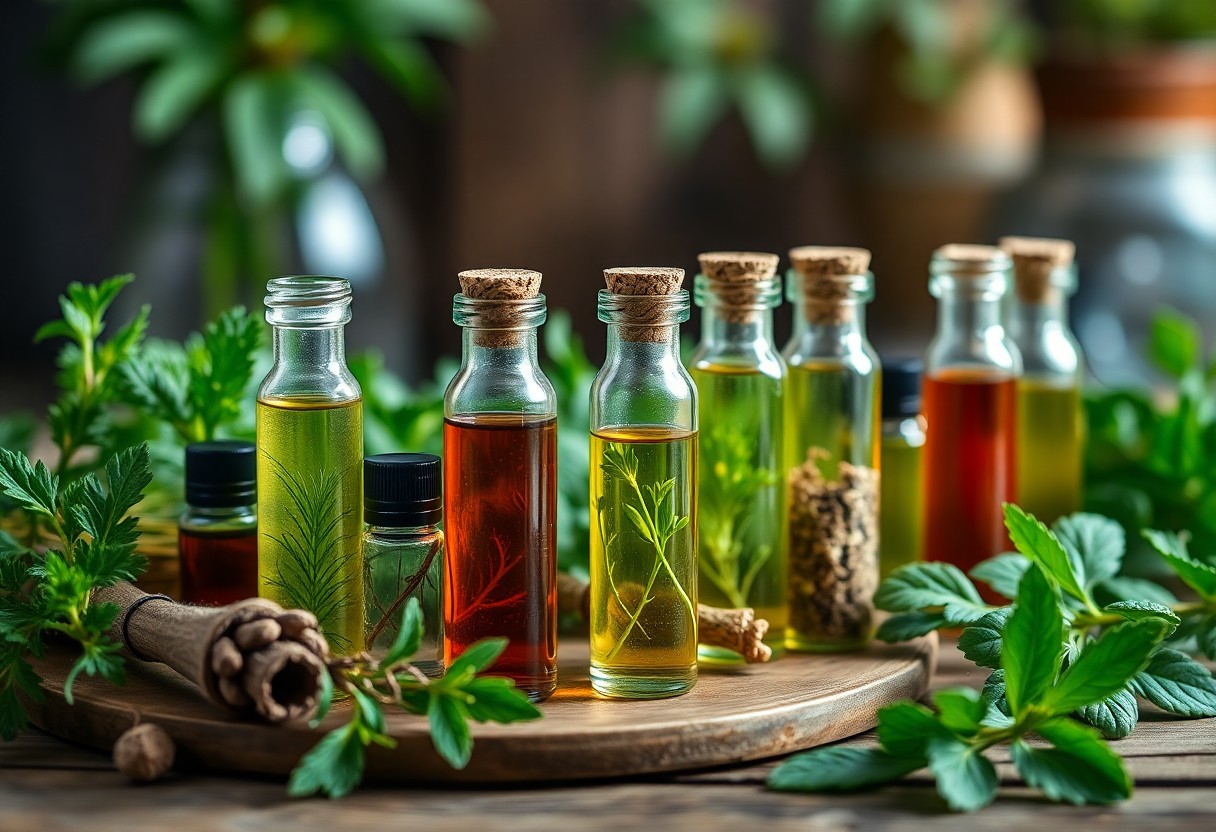
Types of Botanical Extracts
To navigate the world of botanical extracts, it’s vital to understand their various forms. Here are common types you might encounter:
| Essential Oils | Highly concentrated plant extracts utilizing steam distillation or cold pressing. |
| Herbal Tinctures | Alcohol-based extracts made by soaking herbs in alcohol to capture their properties. |
| Powders and Capsules | Dried plant materials encapsulated or ground into powder form for easier consumption. |
| Infusions | Liquid extracts made by steeping herbs in hot water. |
| Decoctions | Strong brews made by boiling plant materials to extract their benefits. |
This diverse range offers unique benefits tailored to your wellness needs.
Essential Oils
There’s a powerful allure surrounding vital oils, known for their captivating scents and therapeutic properties. Extracted from various parts of plants, these oils provide a myriad of health benefits and can be used in aromatherapy or applied topically when diluted. Understanding how to properly use vital oils ensures you maximize their potential in your daily routine.
Herbal Tinctures
Even though herbal tinctures are lesser-known, they are a potent form of herbal extract. These liquid extracts harness the power of botanicals through a solvent, typically alcohol, which extracts the plant’s active components. Their concentrated nature allows you to experience the full benefits of herbs in a small dosage.
Understanding how tinctures work can enhance your use of them. The extraction process preserves the bioactive compounds in herbs, making tinctures effective for various health concerns. You can easily incorporate them into your daily routine, either through direct consumption or by adding them to teas or smoothies for an herbal boost.
Powders and Capsules
There’s a practical aspect to powders and capsules, making them a popular choice for herb consumption. These forms offer convenience and allow you to easily integrate botanical extracts into your lifestyle without the need for complex preparations. Consuming them offers a straightforward way to benefit from plant properties.
Essentially, powders and capsules allow for precise dosing and are an effective way to benefit from herbal properties without any preparation hassle. You can take them as needed or incorporate them into your meals, ensuring you receive the herbal support you seek with ease.
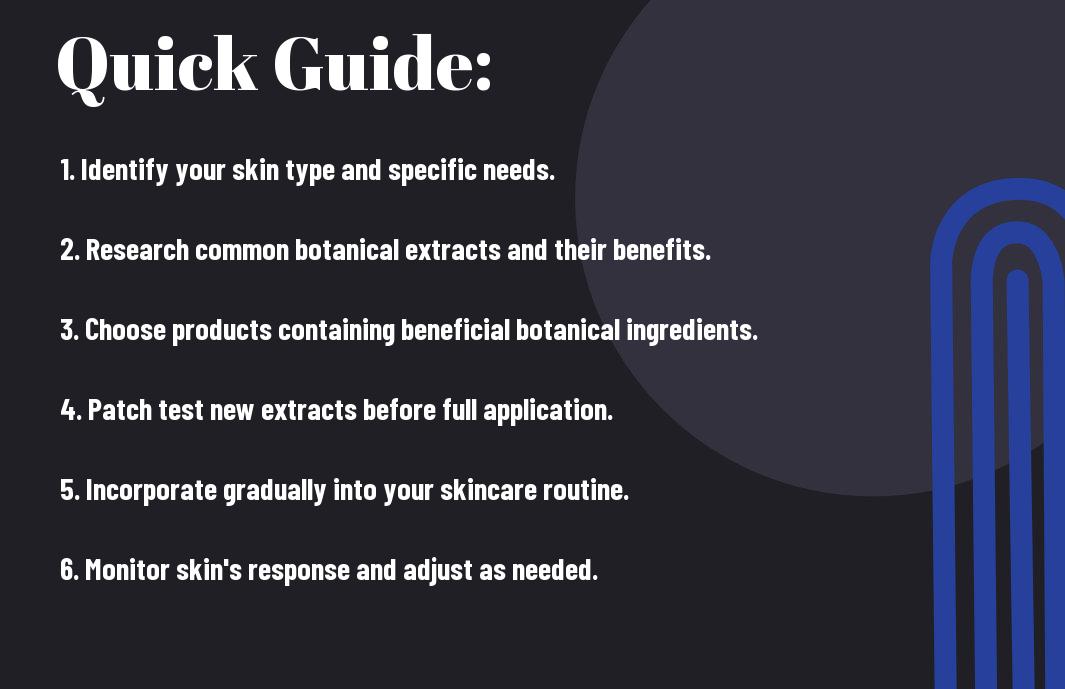
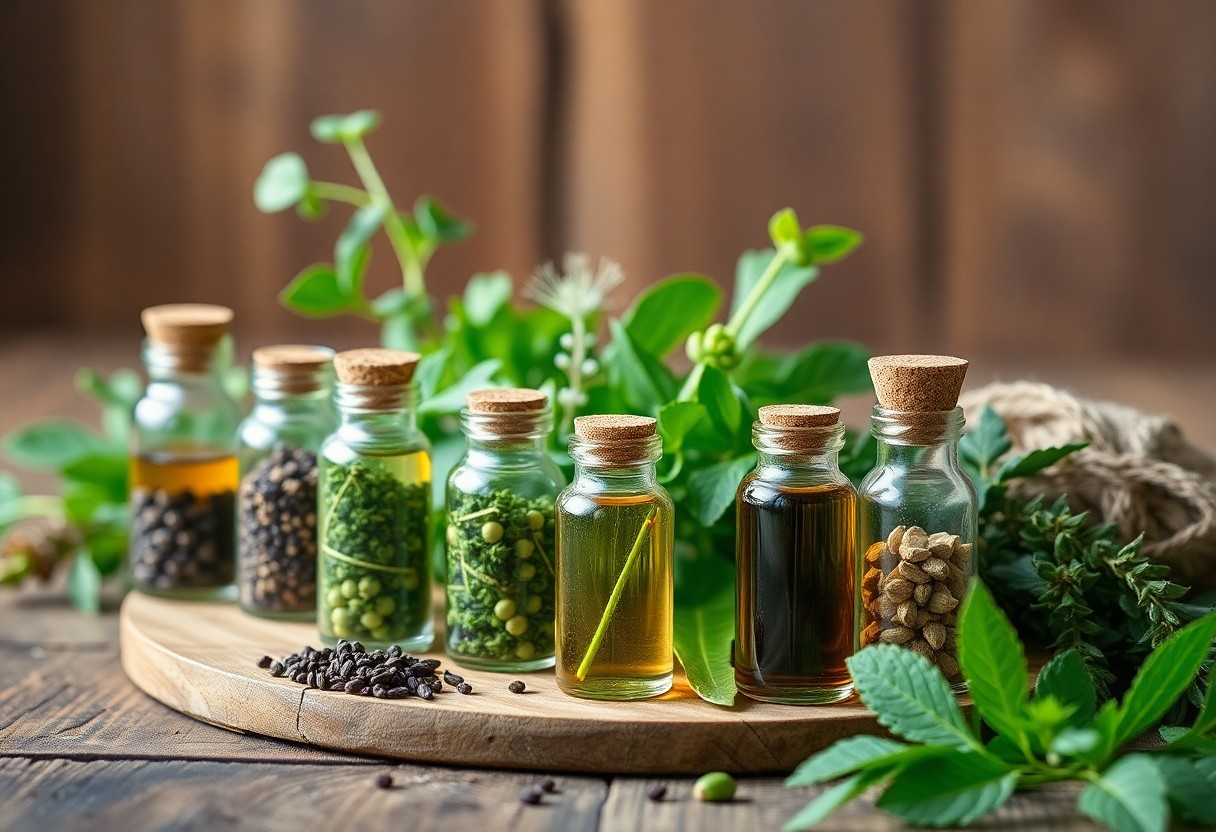
Tips for Selecting Quality Extracts
The selection of quality botanical extracts is important for achieving desired health benefits. To ensure you’re choosing the best products, consider the following:
- Check for third-party testing.
- Look for organic certifications.
- Verify the source of the botanical.
- Examine the extraction process.
Perceiving these factors will empower you in making informed choices about botanical extracts. For more details on botanicals, refer to What Are Botanicals? Your Complete Guide to Plant Botanicals.
Understanding Labels and Certifications
The labels and certifications on botanical extracts provide vital information about quality and purity. Look for certifications such as USDA Organic or Non-GMO Project Verified, which indicate adherence to stringent standards. Additionally, examine the ingredient list carefully to avoid any harmful additives. A clear and concise label will help you assess the extract’s efficacy and safety.
Sourcing Ethically
While selecting botanical extracts, it’s vital to prioritize ethical sourcing practices. Responsible companies often go beyond mere compliance; they invest in sustainable harvesting methods that protect ecosystems and support local communities. By choosing ethically sourced products, you contribute to environmental health and fair trade.
Plus, ethical sourcing often results in higher quality extracts since plants are cultivated in their natural environments and harvested at the right time. This not only enhances their efficacy but also maintains biodiversity. Additionally, transparent sourcing practices provide assurance that you’re supporting products with integrity, making a tangible difference in your health choices.
Step-by-Step Guide to Using Botanical Extracts
Many individuals seek to harness the healing powers of medicinal plants. You can deepen your understanding by exploring A Guide to Common Medicinal Herbs – Health Encyclopedia. Below is a structured guide to help you navigate the use of botanical extracts effectively:
| Step | Action |
|---|---|
| 1 | Select your botanical extract |
| 2 | Determine the appropriate preparation method |
| 3 | Utilize proper application techniques |
Preparation Methods
Guide your exploration of botanical extracts by knowing how to prepare them correctly. Techniques may include infusion, tincturing, or decoction, each yielding different concentrations and effects. Choose a method that aligns with your desired outcome for optimal results.
Application Techniques
Guide your application techniques to ensure maximum benefit from your botanical extracts. You can incorporate them topically, ingest them, or even use them in herbal baths, depending on your health goals. Evaluating your specific needs will help you determine the best method for you.
Extracts offer a variety of application methods to suit individual preferences and health objectives. Whether you choose to create a lotion for skin care or a tea for internal health, consider the concentration and compatibility with your body to achieve the best results.
Factors to Consider When Using Extracts
Unlike conventional supplements, botanical extracts require careful consideration to maximize their benefits. Evaluate the following factors before incorporating them into your routine:
- Quality of the extract
- Source of the botanical
- Possible interactions with medications
- Allergies or sensitivities
The right approach ensures you harness the power of these extracts effectively.
Dosage and Concentration
An appropriate dosage and concentration of botanical extracts are imperative for achieving desired effects. Always check the recommendations provided on packaging or consult a healthcare professional to determine the most suitable amount for your needs.
Intended Use and Benefits
Factors such as your health goals and the specific benefits of each extract play a significant role in effective use. Understanding what you hope to achieve will help you select the right botanical extracts for your needs.
Another aspect to consider is the unique advantages each extract offers. For instance, some extracts may boost energy, while others support skin health or promote relaxation. By aligning your intentions with the benefits of each botanical, you can effectively enhance your wellness journey.
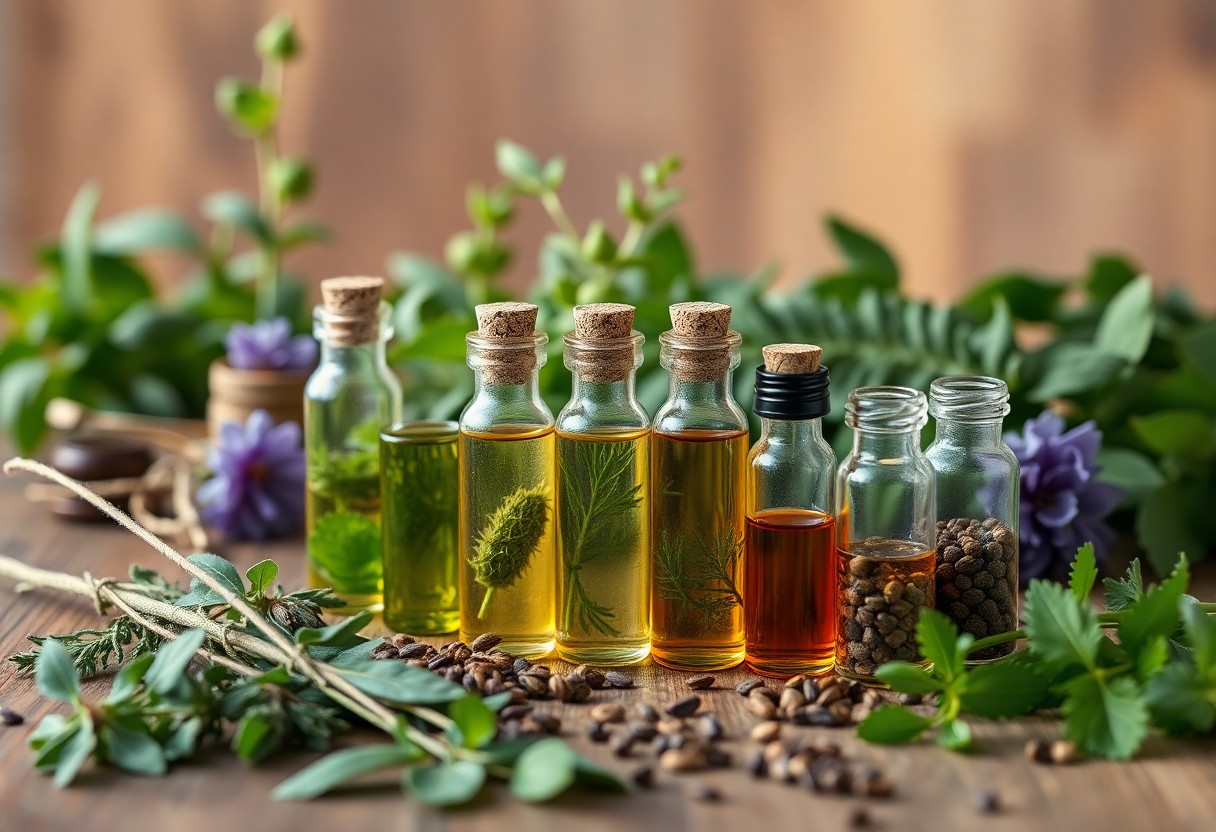
Pros and Cons of Botanical Extracts
Now, understanding the pros and cons of botanical extracts can help you make informed choices about their use. Here’s a breakdown that highlights vital factors to consider:
| Pros | Cons |
|---|---|
| Natural compounds | Possible allergic reactions |
| Rich in antioxidants | Variability in potency |
| Support for wellness | Interactions with medications |
| Wide range of applications | Quality control issues |
| Sustainable options | Not always regulated |
| Minimal side effects for most | May cause gastrointestinal upset |
| Affordability | Limited scientific research |
Health Benefits
On your journey to better health, incorporating botanical extracts can offer numerous benefits. Many of these extracts are known for their anti-inflammatory properties, antioxidant support, and potential to enhance immunity. Additionally, they can help improve your skin health and promote overall well-being. By choosing the right botanical extracts, you can easily integrate natural remedies into your lifestyle.
Potential Risks and Side Effects
One of the key considerations when using botanical extracts is their potential risks and side effects. While many extracts are safe, individual responses can vary widely, leading to unexpected reactions.
Plus, it’s vital to be aware that even natural substances can interact with your body and medications. Some individuals may experience side effects such as nausea, headaches, or allergic reactions. Always consult with a healthcare professional before starting any new botanical regimen, especially if you have existing health conditions or are taking medications. Awareness and precaution go a long way in assuring that you enjoy the benefits while minimizing risks.
To wrap up
To wrap up, understanding beneficial botanical extracts can significantly enhance your wellness practices and improve your overall health. By incorporating these natural solutions into your routine, you can leverage the powerful properties of plants to support your body and mind. Whether you’re seeking to boost your immunity, improve skin health, or simply explore new remedies, this guide equips you with the knowledge needed to make informed choices. Embrace the potential of botanical extracts, and enrich your life with nature’s offerings.
FAQ
Q: What are beneficial botanical extracts?
A: Beneficial botanical extracts are concentrated substances derived from plants that retain the plant’s beneficial properties. These extracts can include antioxidants, vitamins, and other phytochemicals that contribute to overall health and wellness. They are commonly used in skincare, supplements, and herbal remedies.
Q: How are botanical extracts made?
A: Botanical extracts are made through various methods, including steam distillation, cold pressing, and solvent extraction. Each method isolates the desired compounds from the plant material, resulting in a potent extract that can be used in various applications, such as cosmetics and dietary supplements.
Q: What are some common uses of botanical extracts?
A: Botanical extracts are widely used in skincare products for their anti-aging, hydrating, and soothing properties. They are also used in dietary supplements to support health and wellness, and in food and beverages for flavor and nutritional enhancement.
Q: Are there any safety concerns with using botanical extracts?
A: While many botanical extracts are safe and beneficial, some can cause allergic reactions or interact with medications. It’s advisable to conduct a patch test when using new skincare products or to consult with a healthcare professional before taking herbal supplements, especially if you have pre-existing health conditions or are pregnant.
Q: Can you provide examples of popular botanical extracts and their benefits?
A: Yes, some popular botanical extracts include:
– Aloe Vera: Known for its soothing and hydrating properties, often used in skincare.
– Green Tea Extract: Rich in antioxidants, it is favored for its anti-inflammatory effects and skin protection.
– Chamomile Extract: Typically used for its calming effects, both for the skin and when consumed as a tea.
Q: How do I choose the right botanical extract for my needs?
A: Choosing the right botanical extract depends on your specific health goals or skin concerns. Consider what benefits you are looking for, read product labels for ingredient quality, and consult with a reputable source or healthcare provider for recommendations tailored to your individual needs.
Q: Where can I find high-quality botanical extracts?
A: High-quality botanical extracts can be found at health food stores, pharmacies, specialty shops, and online retailers. Look for products that provide detailed information about their sourcing and extraction processes, and choose reputable brands that prioritize quality and transparency.
